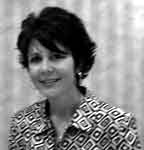
NEADS Conference 2004 - Right On!
Speakers
Jamie Fillion

|
Biography
Jamie Fillion holds a Bachelor of Science Degree in Physical Education and a Masters of Science Degree in Human Communication Disorders. She joined Nova Scotia Community College five years ago with a mandate to develop and implement a coordinated service delivery model for disability services. Jamie sits on the provincial Board of Directors of the Canadian National Institute for the Blind (CNIB) and is President of the Speech and Hearing Association of Nova Scotia. She has received an Award of Excellence in Service to Students with Disabilities from the Canadian Association of Disability Service Providers in Post-Secondary Education (CADSPPE) and was recently awarded the Educator of the Year Excellence Award for her work in the education field for students with learning disabilities.
Audio
PowerPoint
Synopsis
The Special Admissions Process: A Model in Inclusionary Practice
“We are coming …. are you ready?” Nova Scotia Community College (NSCC) has designed its Special Admissions Process to provide students with diverse learning needs the opportunity to access the college’s programs. The Special Admissions Process at NSCC recognizes that in most industries there are various levels of employment opportunities for those with varying levels of ability and skills, and directly responds to the successful inclusionary educational practices of the public school system. Post-secondary institutions are now being challenged to address the needs of students leaving the public school system with curriculum modifications. Our colleges and universities must provide educational opportunities for these students, and serve as the next step in their goals of finding rewarding employment, and enjoying a high quality of life. This dynamic session will provide a successful model of modified post-secondary programs and answer the questions arising from establishing and running a program which provides challenging and exciting educational opportunities. Students, administrators, community members, faculty and staff...are you ready?
Report
Jamie Fillion, Manager, Disability Services, Nova Scotia Community College, explained that Nova Scotia Community College (NSCC) has moved from 130 students self-disclosing and accessing services in 1999, to 700 students this year. That change has given the college an opportunity, as the youngest college in Canada, to set up a good model for dealing with students with disabilities.
The college takes a learning approach to education and has created a model to adapt that approach to students with disabilities. Rather than creating a modified curriculum for students with disabilities, the college focuses on providing appropriate services so that each student can follow a program of study based on their interests. The new model reflects a shift in attitude.
In 1996, the Nova Scotia government introduced the Special Education Act. The act states that every child has the right to an inclusive setting, but community support is lacking, and a gap exists in opportunity and access after Grade 12. The situation precipitated the introduction of the special admissions process at NSCC.
NSCC programs are totally inclusive, and everyone enters their program of choice. The college has an 85% retention rate for students with disabilities. That compares with an average student retention rate of 73% for all of Canada.
At NSCC, students with disabilities self-disclose in their acceptance package, rather than on their application form. That approach ensures that the students are not excluded, and it builds a level of trust. The college also arranges for accommodations to follow students for three years after college, into the employment setting.
The biggest shift has been from the idea of reasonable accommodation and duty to accommodate to the idea of just “being ready” and “making it happen,” said Fillion. The focus is social inclusion and opportunity to participate.
Some of the biggest barriers have been attitudinal, including fear on the part of faculty. Fillion said that she teaches a course on accommodating students with disabilities. In that class, students and faculty can learn from each other about their fears.
Commenting on the merits of universal instructional design, Fillion said that “it’s not about access to information—it’s about access to learning.” Everyone has a responsibility to participate: the institution, staff, and students.
People often want a “cookbook” on how to deal with students with disabilities, she said, but the best approach is an individualized one. “The student tells us what works ... and we put this in the context of learning in that environment.”
The comprehensive approach taken by NSCC includes these elements:
- The Special Admissions Process (an individualized approach to accommodation)
- Universal instructional design
- The “Smart Steps” transition program (an interactive program in which high-school students with disabilities learn self-advocacy and career planning)
- Assistive technology and tutorial labs
- Community partnerships
- A mentoring program
In the future, movement to increase opportunity through community partnerships and advocacy will continue, and professional development for faculty in universal instructional design will increase.